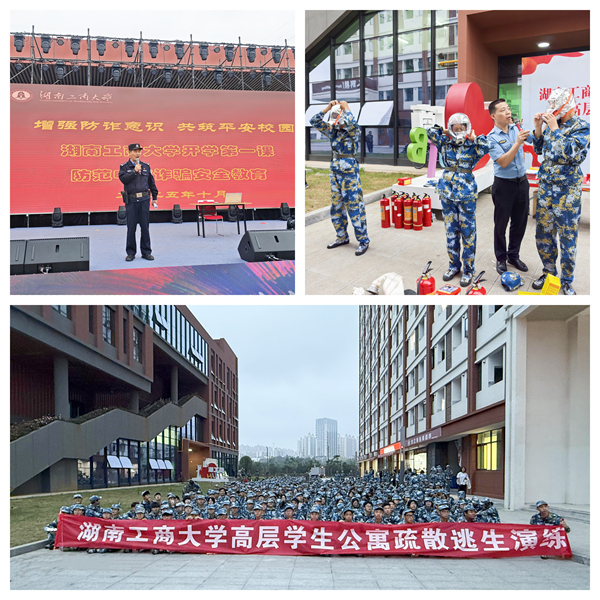HUTB Conducts Safety Education Series Activities for 2025 Freshmen
2025-10-22
From October 16 to 17, the university organizes fire safety training and high-rise student apartment emergency evacuation drills, along with the "First Safety Lesson of the New Semester" anti-fraud lectures at the Moon Island Campus and the North Campus. Through a "real-world drill + case-based teaching" model, freshmen immerse themselves in mastering safety skills, laying a solid foundation for campus safety management.

On the afternoon of October 16, the university conducts an immersive fire safety training session on the square in front of the Honghui Building at the Moon Island Campus. The Security Division, in collaboration with the Student Affairs Division, arranged for over a thousand freshmen to participate in fire safety training and a high-rise student apartment evacuation drill. Fire instructors, drawing on real university fire cases, systematically explained three core knowledge areas: selecting high-rise escape routes, using firefighting equipment, and handling initial fire emergencies. Freshmen take turns practicing fire extinguisher operation and gas mask wearing in the "Equipment Practice Zone," achieving a 100% skill mastery rate.
At 5:00 p.m., a simulated fire alarm sounds. "Thick smoke" spreads inside the Honghui Building. Faculty and students respond promptly, covering their mouths and noses with wet towels, crouching low to evacuate, with floor guides preventing stampedes. The staff volunteer firefighting team conducts a "sweeping" search and rescue for "trapped students." The university hospital simultaneously provides first aid. The Security Division correctly dials 119 to report the fire. Within just five minutes, all personnel are safely evacuated, achieving "zero omissions, zero accidents."
On the afternoon of October 17, the university holds a "First Safety Lesson of the New Semester" anti-fraud lecture at the Feiyue Sports Field on the North Campus. With the theme of "Recognizing and Preventing Fraud," the police officer analyzes high-frequency campus cases such as "fake order rebate scams," "impersonating customer service for refunds," and "online game account trading." The presentation exposes three common tactics used by scammers—emotional manipulation, urgency pressure, and profit lures—and summarizes the "Three Don'ts, One Verify" anti-fraud principle: don’t click unknown links, don’t trust unfamiliar calls, don’t disclose personal information, and always verify before transferring money. The lecture also details preventive measures like "staying alert to traps set by acquaintances" and "guarding your account security bottomline," guiding freshmen to build strong psychological defenses.
Moving forward, the university will regularly carry out themed activities such as special lectures, knowledge competitions, and scenario simulations focusing on anti-fraud safety, fire safety, traffic safety, and mental health. Safety tips will be disseminated through both online and offline channels to build a comprehensive "education–early warning–response" safety management mechanism.
(Reported by Zhang Ying and Yang Lei from the CPC Committee Security Department)









